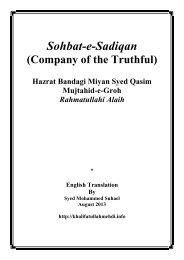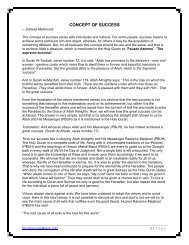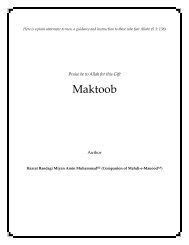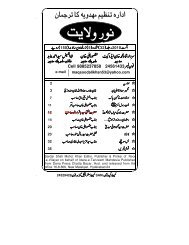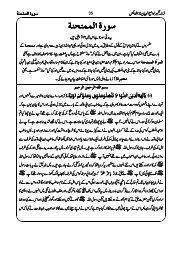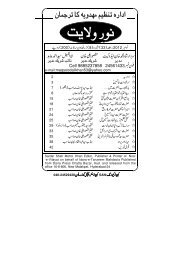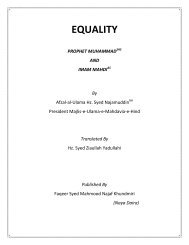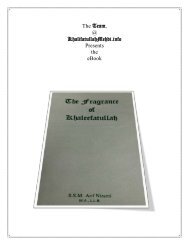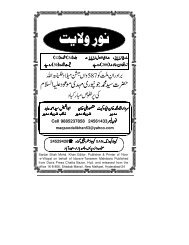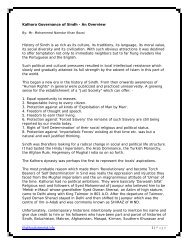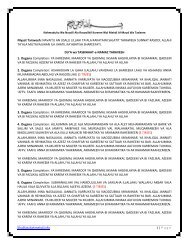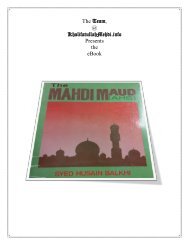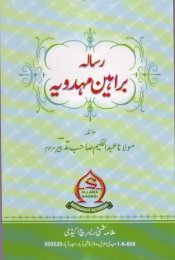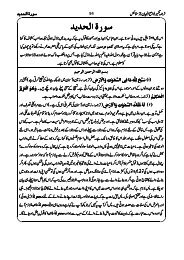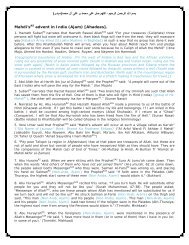Siraj-ul-Absar (English) - Khalifatullah Mehdi (AHS)
Siraj-ul-Absar (English) - Khalifatullah Mehdi (AHS)
Siraj-ul-Absar (English) - Khalifatullah Mehdi (AHS)
Create successful ePaper yourself
Turn your PDF publications into a flip-book with our unique Google optimized e-Paper software.
44<br />
is the kalam [speech] of Allah Most High. Most of the commentators [of Quran] have<br />
explained this verse without going into the details of the relevant points. Hence, if<br />
somebody explains the Quranic Verses in the following manner – ‘yaaa-arzub-la-‘ii<br />
maaa-‘aki’ [‘O earth! Swallow up thy water]; ‘wa yaa-samaaa-‘u ‘aqli-ii [O sky! Cease<br />
pouring’]; that is hold back your water and stop raining; ‘wa giizal-maa-‘u [and the<br />
flood abated]; wa quzi-yal-‘amru [and the destruction of the community of Nuh AS was<br />
completed]; wasta-wat ‘alal Juu-diyyi [and the ark settled down on the Judi] – then,<br />
which prohibited matter can he be accused of?’ 34<br />
Then I will explain the difference between the tavil-e-masmu’ [the permissible<br />
interpretation] and the tafsir-e-mamnu’ [the prohibited exegesis], Insha-Allah.”<br />
Five kinds of Tafsir-bir-Rai<br />
He [Muttaqi] says: This Hadis has been narrated with credits and authority by Abu Daud,<br />
Tirmizi and Nasai 35 . There is another Hadis on this matter which says that ‘The person who<br />
explains the Quran without the [necessary] knowledge sho<strong>ul</strong>d search for his place in the<br />
Hell.’ This Hadis has been reported in Abu Daud as narrated by Ibn ‘Abbas. And Sheikh<br />
Jalaluddin Suyuti RH has said in ‘Al-Itqan fi Uloom-il-Quran’, copying from the writing of<br />
Ibn-e-Naqib that there are five sayings about Tafsir-bir-Rai [exegesis on the basis of one’s<br />
opinion]: (1) writing the tafsir without the knowledge of those <strong>ul</strong>oom [fields or branches of<br />
knowledge] which sho<strong>ul</strong>d be known for writing the tafsir [exegesis]. 36 (2) The writing of<br />
Tafsir of the mutashabihat [allegorical Quranic Verses] the meaning of which is known only<br />
to Allah Most High. (3) The writing of the tafsir that proves the fasid mazhab [corrupt<br />
religion] to be correct in a manner that places the depraved religion as the core and subjugates<br />
the tafsir to it; and making the tafsir to conform to such perverted religion in whichever way<br />
possible, even if such a way is weak. (4) To say, without a valid argument, that certainly the<br />
purport of Allah is this. (5) To write the tafsir with lenient interpretation and under the<br />
influence of one’s carnal desires. All these kinds [of tafsir] are found in this group [of<br />
Mahdavis].<br />
We say: The Sheikh’s saying that all these kinds of tafsir are found in this group [of<br />
Mahdavis] is a slander against us [Mahdavis], because none of these five kinds of<br />
tafsir is found among us. And we will refute the allegations about every kind of the<br />
above mentioned tafsirs. We have already answered the allegation about the first<br />
kind under the saying of the Sheikh “Then among their evils is their writing the<br />
commentaries [exegesis] on the basis of their opinions." 37 We wo<strong>ul</strong>d not repeat it.<br />
Tafsir of Allegorical Quranic Verses<br />
The answer to the second kind [about the allegorical Quranic Verses] is as follows:<br />
We do not do the tafsir of the allegorical Quranic Verses. Neither do we do the tafsir<br />
34 Judi is the name of the mountain on which the ark finally settled.<br />
35 Abu Daud as-Sijistani, Muhammad ibn Isa at-Tirmizi and Ahmad bin Shu’ayb an-Nasai are the three of the<br />
eight Imams of Prophetical Traditions of the ninth Century AD.<br />
36 Writing of Tafsir without the knowledge of these branches of knowledge is not allowed or permitted.<br />
37 Refer Page 30



